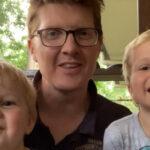The three scholarship recipients hope to forge international research collaborations and share the knowledge they gain at ACR 2023 with colleagues at home.
The ACR announced in July a new travel scholarship in honour of Dr Phil Robinson.
The Phil Robinson Global Scholars program provides free registration and a travel stipend to people from outside the US and Canada, with priority given to applicants from low- and middle-income countries.
To be eligible, applicants need to show a commitment to clinical rheumatology, rheumatology education, research and/or advocacy.
The three recipients for 2023 talked to Rheumatology Republic about their research and the personal and professional impact of the Phil Robinson global scholarship.
Dr Rudrarpan Chatterjee is an assistant professor in the Department of Clinical Immunology and Rheumatology at the Sanjay Gandhi Post Graduate Institute of Medical Sciences in Lucknow, India.
He started his fellowship in clinical immunology and rheumatology in 2019, which is when his research career kicked off.
The main focus of his research is infections and vaccination in autoimmune disease.
“I have focussed mainly on infection burden in lupus and vaccinations in lupus,” he told Rheumatology Republic.
“I feel this is a burden shared by developing countries that’s really underrepresented in the global literature on lupus.”
This year’s ACR Convergence is the first he’s attended in person, and he’ll be presenting poster 2293, Recurrent intracellular infections cluster together in patients of SLE with lymphopenia and active disease.
“I presented virtually in ACR 2020 and 2021, and my oral presentation in ACR 2022 was presented by our research lead in my place, as I couldn’t attend due to visa issues. I look forward to finally being able to attend the conference in person and meeting up with global peers,” said Dr Chatterjee.
He says he’s extremely honoured to be among the recipients of the inaugural Phil C Robinson Global Scholars program.
“The Scholarship offers an opportunity to attend one of the most prestigious conferences in rheumatology and rub shoulders with leaders in the field. I hope to use this to set up future collaborations in my research,” said Dr Chatterjee.
“I feel the countries of the Indo-Pacific are poorly represented in the guidelines and management practices recommended by global bodies like ACR and EULAR. Often this leads to guidelines being out of touch with our circumstances and needs.
“I feel this can only change if rheumatologists from here find representation in global conferences and decision-making bodies. This scholarship helps facilitate that in a small way and I am extremely grateful for it.”
Dr Porntip Intapiboon has worked in the faculty of medicine at Prince of Songkla University in southern Thailand for five years. She conducts research in areas including covid vaccine immunogenicity in autoimmune diseases, lupus biomarkers and biological treatment, and ANCA-associated vasculitis.
“During the emerging covid-19 spreading era, covid vaccines were constrained in our country; the primary vaccine we received was either inactivated or heterologous inactivated-viral vector vaccine regimens,” she told Rheumatology Republic.
“At that time, the vaccine immunogenicity and the appropriate vaccine regimens in autoimmune disease patients were questionable.”
She says it was lupus that inspired her to become a rheumatologist.
“The mystery of disease pathogenesis and the diversity of disease manifestations fascinate me to do SLE research, especially biomarkers in SLE.
“At present, I am a lupus research fellow at Leeds Institute of Rheumatic and Musculoskeletal Medicine, UK. My research is on the proteomic profiles in at-risk ANA-positive populations and biological treatment in SLE.”
Like SLE, she says, AAV is challenging in terms of diagnosis and treatment decisions.
“A trailer treatment strategy depends on the differences in ethnicity, severity and reimbursement policy from country to country.”
Dr Intapiboon went to last year’s ACR Convergence in Philadelphia. When attending an international rheumatology congress, she aims to catch up on current basic and clinical rheumatology knowledge, and potentially make research collaborations.
“I will relay the knowledge gained from participating in this meeting to my colleagues, especially my fellow rheumatologists, and improve autoimmune patients’ quality of care.”

Dr Becky Abdissa Adugna, Assistant Professor at the Addis Ababa University in Ethiopia, says that rheumatology in Ethiopia is in its infancy, and points out he is one of only two rheumatologists in the country of 120+ million people.
After graduating from KwaZulu-Natal University in South Africa, he returned home and established Ethiopia’s only rheumatology clinic in 2021.
“I conduct research and teach both undergraduate and postgraduate students and treat rheumatic diseases,” said Dr Abdissa Adugna, who’s co-author on poster 2082, Delivery of rheumatology education to internal medicine residents in Rwanda: Evaluation of a new virtual rheumatology course supplemented by on-site clinical teaching.
“I am working on a rheumatology registry called RORDE – Registry Of Rheumatic Diseases in Ethiopia,” he said.
“My main focus of research includes rheumatoid arthritis, lupus and gout, and I’m working on studies like steroid side effects in SLE, health-related quality of life in RA and SLE, and comorbidities in SLE and characteristics of connective tissue disease-associated interstitial lung disease.”
Dr Abdissa Adugna has previously attended ACR Convergence virtually, and was delighted to receive the Phil Robinson scholarship to attend in person this year. Unfortunately, he was unable to do so due to visa issues, but has already presented virtually at the Global Rheumatology Summit on Friday.
“ACR Convergence helps me to connect with the international rheumatology community,“ he told Rheumatology Republic.
“I want to create a rheumatology centre of excellence in Ethiopia, and collaboration with the international scholars in research will be pivotal to that.”
Becky Abdissa Adugna ??
— Rheum Cat (@rheum_cat) November 10, 2023
how were rheum services established?
NONE in Ethiopia in 2016#ACR23 #GlobalSummit pic.twitter.com/favkkzoJTn





